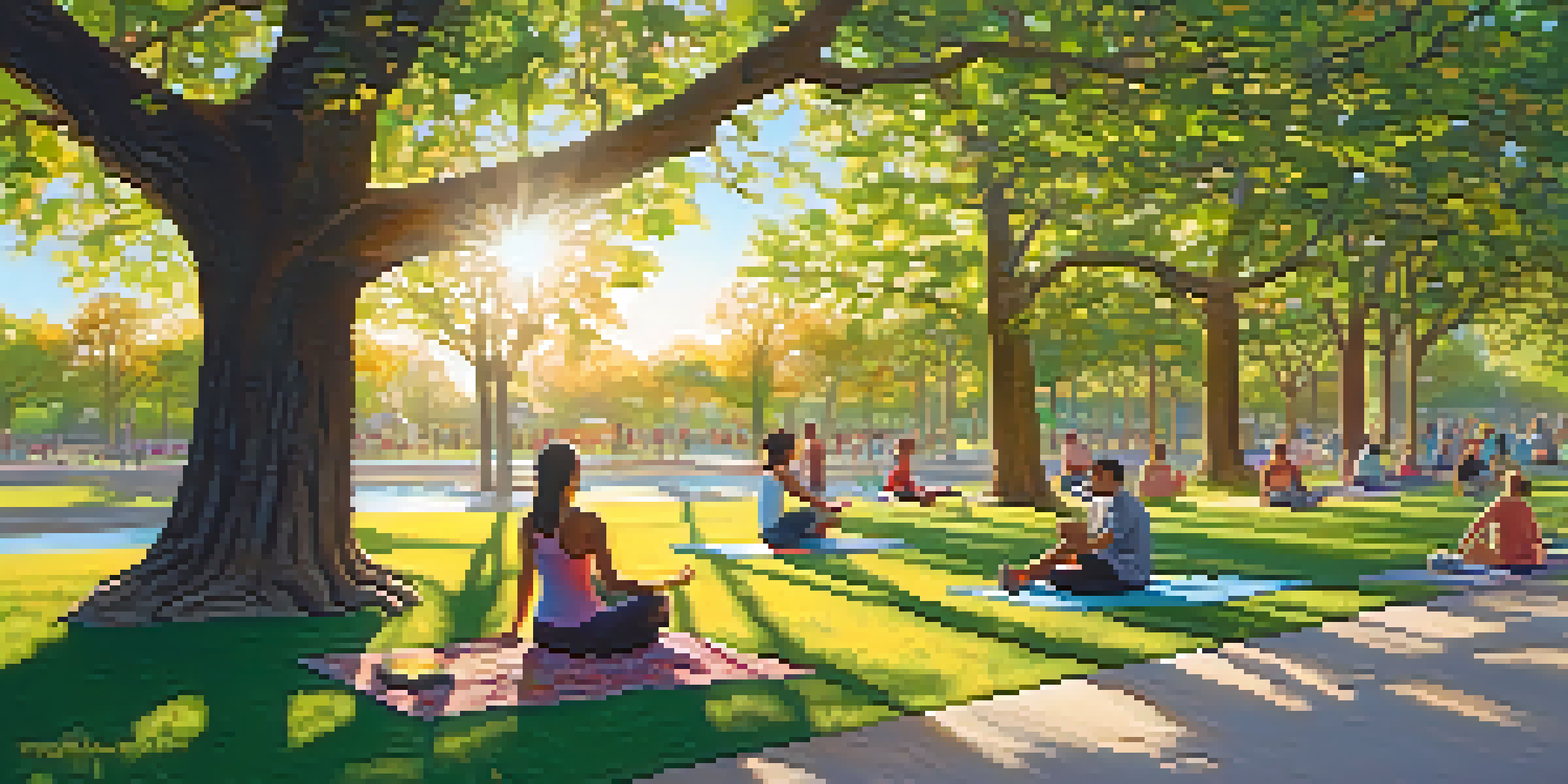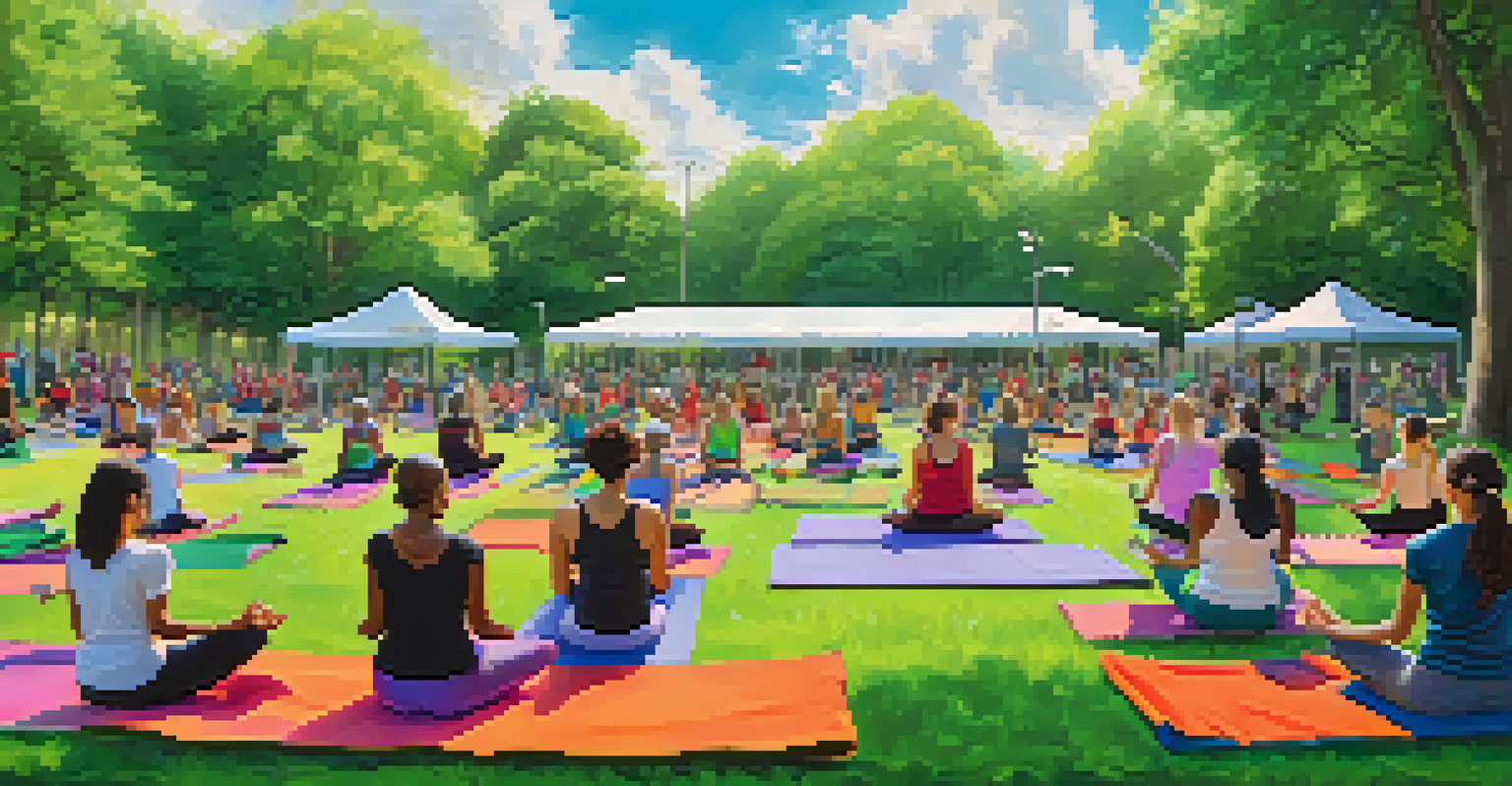Parks as Urban Oases: Mental Health Benefits of Green Spaces

The Importance of Green Spaces in Urban Environments
In the hustle and bustle of city life, green spaces serve as vital retreats. Parks offer a breath of fresh air amidst the concrete jungle, providing a much-needed escape from urban stressors. They create a contrast that allows residents to reconnect with nature, fostering a sense of tranquility.
In every walk with nature one receives far more than he seeks.
Research shows that access to green spaces can significantly improve mental well-being. For instance, individuals living near parks report lower levels of anxiety and depression. This natural remedy highlights the essential role that urban parks play in our emotional and psychological health.
Moreover, these green oases facilitate community interactions. They encourage socializing and foster a sense of belonging, which is crucial for mental health. When people gather in parks, they create bonds that contribute positively to their overall well-being.
Nature's Impact on Stress Reduction
Spending time in nature has a profound impact on reducing stress levels. Simply taking a stroll through a park can lower cortisol levels, the hormone associated with stress. This natural setting allows for a mental reset, helping individuals to unwind and recharge.

Imagine listening to the rustling leaves or observing the playful antics of squirrels. Such experiences can shift your focus away from daily worries, promoting a calming effect. Even a brief exposure to greenery can lead to improvements in mood and relaxation.
Green Spaces Boost Mental Health
Access to parks significantly enhances mental well-being by reducing anxiety and fostering community connections.
Additionally, studies suggest that engaging in nature walks can lead to increased feelings of happiness. These moments spent outdoors help to release endorphins, the body's natural stress relievers. Overall, urban parks provide the perfect backdrop for stress management.
Social Connections Fostered by Parks
Parks are not just spaces for solitude; they are also hubs for social interaction. Communities often gather in these areas for picnics, sports, or simply to enjoy each other's company. This socialization is essential for mental health, as it combats loneliness and fosters connections.
Parks are not just places to enjoy nature; they are essential to our mental and emotional well-being.
In fact, studies have shown that social ties can significantly impact our mental well-being. Regular interactions with friends and family in green spaces can enhance feelings of support and belonging. Parks facilitate these connections, making them integral to community life.
Moreover, events such as community yoga classes or outdoor movie nights can bring diverse groups together. These shared experiences can create lasting friendships and strengthen community bonds, ultimately contributing to a healthier mindset.
The Role of Green Spaces in Physical Activity
Engaging with parks often leads to increased physical activity, which is closely tied to mental health. Activities like walking, jogging, or playing sports can boost endorphins and improve mood. Parks provide the perfect environment for these activities, encouraging a healthier lifestyle.
For instance, a weekend spent biking in a local park can do wonders for both physical and mental health. The fresh air, combined with the joy of movement, creates a positive feedback loop. The more active we are, the more our mental health benefits.
Nature Reduces Stress Effectively
Spending time in natural settings lowers stress levels and promotes relaxation through physical activity and mindfulness.
Furthermore, parks often include facilities like trails and fitness zones, making it easier for people to stay active. By promoting exercise, these spaces help combat mental health issues, showing that the connection between physical health and mental wellness is indeed strong.
Mindfulness and Nature: A Perfect Pair
Spending time in parks encourages mindfulness, a practice beneficial for mental health. The serenity of nature provides an ideal backdrop for being present in the moment. When surrounded by trees and flowers, it becomes easier to let go of distractions and focus on the here and now.
Mindfulness practices, such as meditation or deep breathing, can be amplified in green spaces. The calming sounds of nature, like birds chirping or leaves rustling, enhance relaxation. This simple act of being in nature can lead to improved concentration and reduced anxiety.
Moreover, taking a moment to observe the beauty around you can spark gratitude and joy. These positive emotions significantly contribute to mental well-being, illustrating how nature and mindfulness work hand in hand to promote a healthier mindset.
Environmental Benefits of Urban Parks
Urban parks do more than just benefit mental health; they also contribute to environmental health. Trees and plants help improve air quality, making the city a healthier place to live. Cleaner air not only supports physical health but also enhances overall well-being.
Additionally, green spaces help mitigate the urban heat island effect, keeping cities cooler. This contributes to a more pleasant outdoor experience, encouraging people to spend more time outside. The benefits of parks extend beyond individual health to include community and environmental wellness.
Equity in Park Access is Essential
Ensuring equitable access to green spaces is crucial for community well-being, particularly in underserved neighborhoods.
Moreover, parks promote biodiversity, supporting various plant and animal species. This ecological diversity can create a richer experience for visitors, deepening their connection to nature. Ultimately, urban parks symbolize a balance between human life and nature, enriching our lives in multiple ways.
Access and Equity in Urban Green Spaces
While the benefits of parks are clear, access to green spaces is not always equitable. Many urban areas lack sufficient parks, particularly in low-income neighborhoods. This disparity can limit opportunities for mental health improvements among these communities.
Advocating for equitable access to parks is crucial for promoting overall community well-being. Efforts to create more green spaces in underserved areas can help bridge this gap. Everyone deserves the mental health benefits that parks provide, regardless of their zip code.

Additionally, community involvement in park design can ensure that these spaces meet the needs of all residents. Engaging locals in the planning process fosters a sense of ownership and pride, further enhancing the park's impact on mental health.